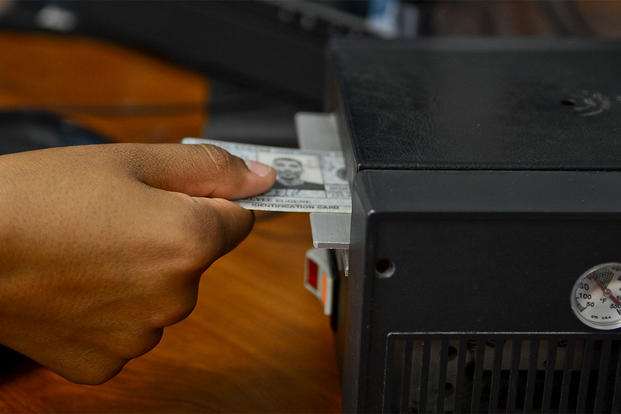Military dependent and retiree ID cards set to expire this year will get an automatic extension through September, while some other ID card updates and enrollments are now permitted by fax or mail, according to new Pentagon guidance.
The changes are designed to help military families and retirees avoid visiting base ID card offices during the novel coronavirus pandemic, the memo states. The change was announced in an April 7 memo sent to the service chiefs and signed by Matthew Donovan, under secretary for personnel and readiness.
Typically, dependent and retiree military ID card enrollments and updates must be done in person at one of the Pentagon's 1,600 ID card offices. While some paperwork can be signed and turned in electronically, cards must generally be retrieved in person.
Normally, expired ID cards can be confiscated at base gates, and military children over the age of 10 are required to have their own card. The Defense Enrollment Eligibility Reporting System (DEERS) manages personnel information across the Defense Department, including keeping track of when benefits expire and who is currently enrolled.
Related: The Latest on the Military's COVID-19 Response
"To ensure DoD ID card offices are postured to maintain continuity of operations, and to minimize the number of non-essential required visits at DoD ID card offices, the following guidance is in effect through September 30, 2020," the memo states.
The new ID changes include:
-
ID card expiration date will be extended.
If a user is still enrolled in DEERS, their ID card will be valid through Sept. 30, regardless of the printed expiration date, the guidance states. If a user is no longer enrolled, their ID card expiration date will not be extended. -
Base officials will review enrollment.
Rather than simply confiscate an expired ID, base officials, including gate guards, will first confirm whether the holder is still enrolled in DEERS. -
Some ID cards will be available by mail order.
How ID cards will be issued by mail varies by service. The memo allows new family member enrollment, as well as eligibility updates and first-time or replacement ID cards to be processed remotely by mailing or faxing copies of documents and application forms. Users should mail only copies of their official documents, such as marriage or birth certificates, not originals. -
ID cards issued by mail will typically be set to expire in one year.
Although individual services might have their own rules, the memo requires the cards to last no more than a year. Currently, ID cards are automatically set to expire every four years. To stay enrolled, users will be required to bring the original versions of their ID documents to an ID card facility. -
The age when children must get a military ID card is raised.
Currently, military kids must get an ID when they turn 10 years old. The memo bumps that age to 14. -
Guard and Reserve family members should keep their current ID cards.
When a Guardsman or reservist is mobilized, their families typically are issued a different ID card reflecting that status. The memo instructs those families to instead keep their current IDs.
Unlike dependent and retiree ID cards, common access cards (CAC) used by uniformed troops and Pentagon civilian employees must still be obtained in person within 30 days of their expiration date, according to the memo. The guidance also puts on hold receiving a new CAC due to rank or name changes.
ID card facilities typically issue between 18,000 and 20,000 military ID cards each day, the memo states.
Just how users should go about turning in information for their mail-order ID cards varies by service.
The Army, for example, wants users to first contact their nearest Real-Time Automated Personnel Identification System (RAPIDS) ID card office to receive instructions on where to mail their documents. The Marine Corps plans to process new enrollments by mail only and will require families to re-enroll with their original documents within 90 days of being issued their ID. Contact information for ID card offices can be found on the RAPIDS website.
A full list of required documents and available mailing and contact addresses is available here.
-- Amy Bushatz can be reached at amy.bushatz@military.com.
Read more: Nimitz Becomes 4th Aircraft Carrier with COVID-19 Case: Report












